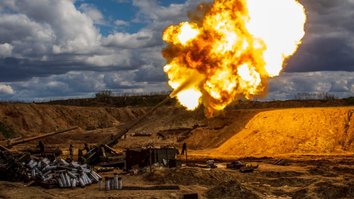BEIJING -- A once-in-a-generation security crisis in Russia compounded fears in Beijing that a strategic partner central to its global ambitions is not as stable as it hoped, analysts say.
China has emerged as Russia's principal ally since Moscow invaded Ukraine in February 2022, leaving Russia internationally isolated.
During a March summit in Moscow, presidents Xi Jinping and Vladimir Putin declared that their vast countries' ties were "entering a new era".
This weekend's crisis in Russia saw private mercenary group Wagner Group chief Yevgeny Prigozhin try to storm Moscow.
Wagner mercenaries advanced about 900km on Saturday (June 24) before halting 200km south of Moscow, according to Prigozhin.
Prigozhin accepted a settlement that exiled him to Belarus.
China weighed in on Sunday evening -- well over 24 hours after the mutiny began.
"As a friendly neighbour and a new era comprehensive strategic co-operative partner, China supports Russia in protecting national stability and achieving development and prosperity," the foreign ministry said in a statement.
The issue was Russia's "internal affair", the ministry added.
On Sunday, Chinese Foreign Minister Qin Gang met with Russian Deputy Foreign Minister Andrey Rudenko in Beijing.
The two diplomats discussed "China-Russia relations", Beijing said, as well as "international and regional issues of common concern".
In its readout of the talks, Moscow said Beijing had "expressed support for the efforts of the leadership of the Russian Federation to stabilise the situation in the country".
Beijing says it is a neutral party in the war but has been criticised by Western countries for refusing to condemn Moscow and for its ties with Russia.
China holds the upper hand in the relationship with Russia and its sway is growing as Moscow's international isolation deepens, say analysts.
'Quite shocking'
By the time the foreign ministry issued its statement, the rebellion in Russia had been quelled, with the Kremlin announcing Prigozhin's departure for Belarus and its decision not to prosecute him or Wagner's members.
Analysts say that Beijing opted for a "wait-and-see" approach to the crisis, driven in part by an understanding that the rebellion exposed fissures in Putin's grip.
"China has already been surprised at Russia's poor military performance in Ukraine," Susan Thornton, a former senior US diplomat specialising in Asia, told AFP by email.
"This event will likely be seen as a further indicator of weakness/decay."
China's leaders have long framed Putin's Russia as a bulwark against the West.
Prior to the latest unrest, Beijing likely "did not doubt that Putin is the undisputed leader of Russia", said Victor Shih, a specialist on Chinese politics at University of California in San Diego (UC San Diego).
But with his authority challenged in such a "blatant way", Shih said, "China will now think very hard about power dynamics in Russia."
China is Russia's largest economic partner, with trade between them reaching a record $190 billion last year, according to Chinese customs data.
China's imports of Russian crude since the invasion of Ukraine have almost doubled, according to Beijing.
"It was probably quite shocking for Beijing and for Xi Jinping personally that Russia's internal defence mechanisms all failed," said Bjorn Alexander Duben, a scholar of Beijing-Moscow ties at Jilin University in China.
"It will certainly want to learn lessons from that."
'A new low'
China has long grappled with dramatic events in its northern neighbour -- its leadership pointing to the sudden collapse of the Soviet Union and the chaos that followed as vindicating Beijing's rigid system of government.
"China is used to those dramatic changes in Russia, though [it] may not necessarily like them," said Yu Bin, a professor at Wittenberg University in Ohio.
Fears of a civil war in Russia have been looming for weeks now, as feuds among various factions within the Kremlin have increasingly spilled into public view.
Prigozhin had warned on May 24 that Russia could face a revolution and lose the conflict in Ukraine unless the nation's elite becomes serious about fighting the war, Reuters reported.
The weekend's events might also accelerate Beijing's efforts to play peacemaker in a bid to end the Ukraine war on Moscow's terms.
"The latest events are likely leading to a new low in Chinese assessments of Russia's state capacity and political stability in Russia," UC San Diego's Shih said.
"This is a clear sign that the invasion of Ukraine is undermining fundamental stability in Russia."
China may have calibrated its response in part out of concerns of embarrassing an ally, said Alexander Gabuev, director of the Carnegie Russia Eurasia Centre.
"China treads very, very carefully," he said.
"I think that the insurrection in Russia came as a surprise; you see the [Chinese] media and everybody is very cautious in the official statements."

![Russian President Vladimir Putin and Chinese President Xi Jinping make a toast during a reception following their talks at the Kremlin in Moscow on March 21. [Pavel Byrkin/Sputnik/AFP]](/cnmi_pf/images/2023/06/26/42732-33bt2kw-highres-585_329.jpg)






